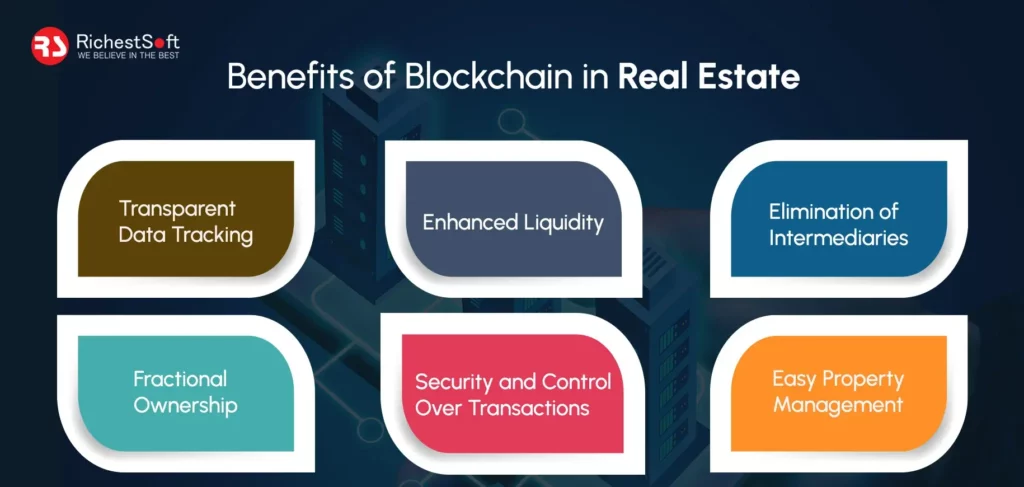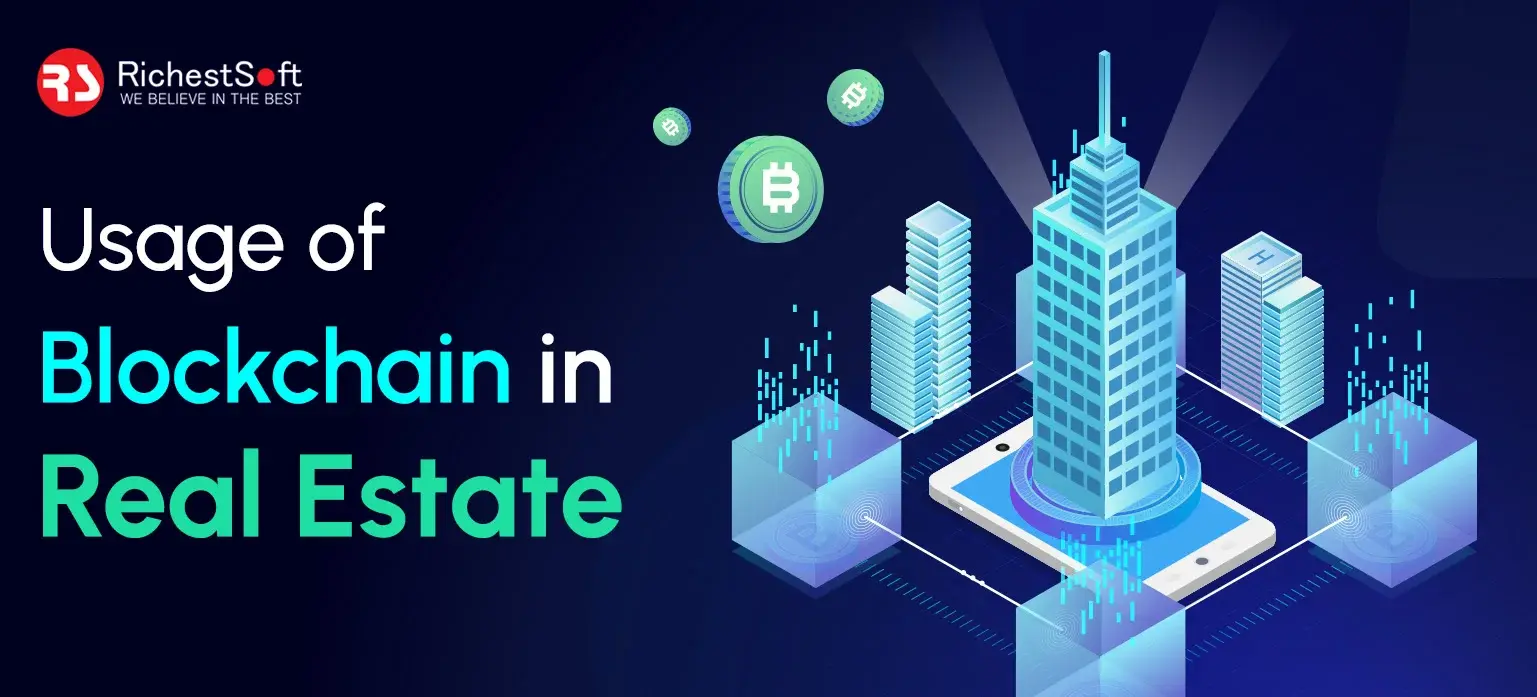October 29, 2025
The real estate industry has opened up extensive opportunities for entrepreneurs to establish successful businesses. However, the transformative power of innovative technologies like blockchain has changed the overall shift in the competitive market. This technology has generally improved efficiency, security, and privacy in asset leasing, purchase and sale, and management.
Yes! Blockchain in Real Estate has become more than just a novelty; in other words, it has become a practical solution with several use cases in the industry.
Do you want to know about those use cases? If so, stay connected on our blog! Below, we have shared detailed information about the benefits and real estate blockchain use cases.
Keep reading!
How Blockchain Works for Real Estate
Blockchain is a super smart digital ledger. It is a giant book that records every transaction in a tamper-proof and transparent way. Now, let’s blend technology with real estate. With blockchain, the struggle of buying and selling has been smoothed. If you are thinking of investing in a top custom blockchain app development for your real estate business, consider understanding how blockchain works for real estate.
Here is how it works:
Step 1: Tokenization
Initially, the property undergoes tokenization, which converts it into a digital asset like digital currency and facilitates its representation on the blockchain network.
Step 2: Smart Contract
Next, smart contracts come into play. This digital agreement aims to execute automatically when pre-determined conditions are met. In real estate transactions, smart contracts ensure the seamless transfer of ownership and assets without intermediaries.
Step 3: Execution
The smart contract is triggered when a buyer wishes to acquire the property. It verifies the terms of the agreement and executes the transaction, automatically transferring ownership from the seller to the buyer.
Blockchain in real estate’s decentralized nature eliminates the need for intermediaries. The technology enables the transactions to occur directly between the involved parties, streamlining the process and reducing associated costs.
Every transaction is securely recorded on the blockchain to ensure transparency and reduce the risk of fraud or tampering.
Real Estate Blockchain Use Cases
Here are some of the real estate blockchain use cases:
Use Case 1— Blockchain-Based Smart Contracts
Smart contracts are digital, self-enforced contracts between a vendor and a customer. Examples of blockchain-based smart contracts are offer sheets, letters of intent, and listing agreements. Smart contract development solutions defines the terms, stores them in the blockchain network, and monitors their execution. Software for real estate can automatically terminate if one party violates the terms.
Compared to the old way, smart contracts speed up transactions and eliminate the need to negotiate with lawyers, brokers, and bankers.
Use Case 2— Automated Rent Payments
Here comes the other use case of blockchain in real estate. Blockchain allows you to sign and pay for real estate lease agreements. There is no need to do manual reconciliations and pay rent/dividends.
With expert RPA bot development and Leading custom AI integration in real estate, owners and renters can calculate rent automatically based on data from devices and utility bills. Let’s understand this use case via an example rental app that recently opened a cryptocurrency platform. The startup automates every rental process step, from looking for a suitable home to inking the deal. Renters can pay, for example, in bitcoin, while landlords will receive a payment in fiat currency. With the new blockchain option, apps create a future of secure and affordable cross-border rent for those looking for a home.
Use Case 3— Accessible Blockchain Real Estate Investment
Blockchain has made crowdfunding more accessible. Tokenization blockchain development has converted the property into digital assets, each sharing residential and commercial ownership. It allows multiple owners to buy and sell property without any intermediaries.
Blockchain technology helps store, verify, and transfer tokens. Multiple individuals backing a real estate project speed up its funding and increase its efficiency. Moreover, it allows property developers to involve investors outside their immediate network and vet them without paperwork.
Use Case 4— Simpler Construction And Supply Chain Management
Blockchain is an evolving technology for contractor and supply chain management. Logistics management software with blockchain can enhance performance. For example, huge real estate projects are difficult to manage due to fractured subcontracting and procurement practices and a lack of supply chain transparency.
It is no wonder blockchain platforms simplify procurement with reputation management for suppliers and subcontractors, enhancing high performance. Smart contract development in real estate automates contract agreements and payment terms to enhance financial management. Also, blockchain proves the authenticity of premium goods at their point of origin by associating products with non-fungible tokens and using these as digital blockchain certificates.
Use Case 5— Streamlined Mortgage Management
Taking a mortgage is a lengthy process, including pre-qualification, background & credit history check, mortgage application, loan processing & information verification, and underwriting the evaluation of risks.
These steps take, on average, 1-2 months. However, blockchain can speed up considerably at this time. As all parties involved in the transaction get access to the applicant’s information, it can be verified almost instantly. In a best-case scenario, approving the mortgage and transferring the funds takes just a few days instead of a month.
Use Case 6 —Automated Real Estate Accounting
Duplicate actions, excessive documentation, and periodic controls are all manual, labor-intensive tasks that cost real estate companies money. Each audit is a lengthy and costly endeavor that wastes your accountant’s time.
That’s when blockchain ensures the maintenance of separate records directly coming from transaction receipts for real estate firms. With blockchain in real estate, tampering with your accounting records is impossible. The inherent trust behind the technology allows auditors to check huge amounts of data in record time, decreasing audit costs.
In addition to reducing costs, businesses can automate many accounting jobs to eliminate human errors.
Use Case 7—Digitalized Property And Land Registries
Land registers have a huge problem. These ownership rights are likely recorded on a paper document that is incredibly easy to lose or forge.
All registrations are recorded on a private ledger and later validated using the top NFT blockchain. This provides an immutable history of transactions that simplifies auditing and offers great transparency.
Moreover, the technology can reduce the time to register a real estate deal from 3-6 months to just one hour.
Benefits of Blockchain in Real Estate Transparent Data Tracking
Transparent Data Tracking
Blockchain uses ledger technology that lasts as long as the network is running. As a result of this, overall data on the property, transactions, or the history of the project is recorded, making it available for future owners and investors. Blockchain enables both parties to agree on terms based on data. It minimizes the fraud and default chances.
Enhanced Liquidity
Real estate is typically considered an illiquid asset, as it cannot be easily liquidated without a significant loss in value. However, blockchain technology can substantially level up the liquidity of real estate through real estate tokenization and fractional ownership. This makes the property easier to purchase and attracts more organic investors.
Blockchain in real estate provides transparent and reliable records for any property, enables and secures multi-signature contracts, and eliminates extensive paperwork.
Elimination of Intermediaries
Real estate has always had multiple intermediaries – brokers, agents, property managers, lenders, attorneys, appraisers, etc. Blockchain-powered platforms directly connect investors and sellers of property to eliminate real estate intermediaries and their commission charges for services.
Blockchain-based systems automatically verify the legitimacy of the title transfer. The technology knocks out third-party transaction validators while saving time, money, and energy spent on transaction closing.
Fractional Ownership
Blockchain enables fractional ownership, meaning multiple parties share a property’s expenses and ownership. In this way, several investors can pool their resources and invest in a property share they wouldn’t have been able to buy on their own.
Security and Control Over Transactions
Blockchain in real estate leads to fraud reduction. It reduces the need for third parties to participate and ensures all transactions are done securely.
The technology has eliminated the need for extensive documentation and various intermediaries and has effectively changed the overall situation.
Easy Property Management
Here comes the other advantage of blockchain in real estate—easy property management. The evolution of blockchain in the real estate industry simplifies the paperwork for property management, which almost takes up the time of many other tasks. The tools and software used traditionally are now being replaced with better versions and upgrades.
It also enables cost reduction and less time needed for administrative tasks.
Develop An Effective Real Estate Blockchain App With RichestSoft
It’s no longer a surprise that blockchain has huge opportunities in real estate software development. However, blockchain integration isn’t something that can happen overnight. Real estate businesses need the right expertise. And let us tell you that RichestSoft is the ideal choice for you. As an esteemed blockchain app development company, we specialize in building top-rated blockchain-based software.
We have more than 15+ years of experience helping real estate businesses get a high-end software backend with emerging technologies like blockchain and AI integration. We offer well-thought-out blockchain app development services for various industries, including real estate. Thanks to our expertise in the field and a team of developers with trending skills, we always deliver the expected results and help real estate organizations power up their businesses.
Conclusion
Overall, blockchain in real estate holds transformative potential. It promises smoother transactions, enhanced security protocols, and broader market access through innovations like tokenization.
Adopting blockchain in the real estate sector can leverage many advancements to foster a healthier, more powerful market environment. So don’t let a second go by in decision-making, and contact RichestSoft to get a productive and effective blockchain-based real estate app.
FAQs
1. What does blockchain actually do for real estate?
It keeps property deals honest. Every record stays open and traceable, so there’s less room for fraud or confusion. Buyers and sellers can see the same details without needing to chase paperwork.
2. How can blockchain benefit real estate investors?
It gives investors more freedom. Instead of buying a full property, they can invest in smaller shares and trade them when they want. It also helps track ownership clearly without hidden steps.
3. What are some real-world examples of blockchain use in real estate?
It’s being used for rental payments, smart contracts, and digital deeds. Some developers use it to manage suppliers, too. It’s basically making the whole system more organized and transparent.
4. Is blockchain safe to use in real estate transactions?
Yes. The data is stored across many computers, not in one single place, so it’s almost impossible to fake or delete anything. That makes every deal much safer
 +1 315 210 4488
+1 315 210 4488 +91 99888 06489
+91 99888 06489








